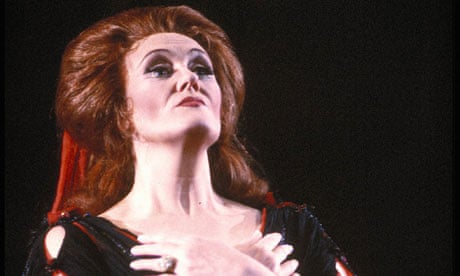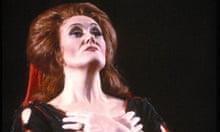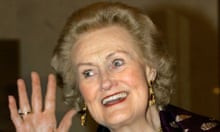'One of God's pranks was to make Joan an overgrown schoolgirl and then give her a divine voice." The grand lady who made that remark was Dame Edith Evans, and anyone who ever saw her on the stage will almost taste the Lady Bracknell tone of her voice. It was more than a witticism; it summed up to perfection the paradox of Joan Sutherland, who has died aged 83.
From the momentous evening of 17 February 1959, when the Covent Garden audience went almost as mad as Lucia di Lammermoor herself, Sutherland was to rank as one of the first ladies of international opera, yet she never behaved like a prima donna. As she would explain herself: "You couldn't possibly be a prima donna in my family, because if you showed even a hint of temperament you'd have been packed off to bed without any supper." And so throughout her career she would be found joking and laughing uproariously in her dressing-room only minutes after giving an overwhelming performance of some tragic operatic heroine.
The presbyterian atmosphere of Sutherland's home in her native Sydney was the result of her father William McDonald Sutherland's being a Scots immigrant. Her mother, Muriel, who gave up a professional career to marry, continued to practise her daily singing lessons, so the incomparable Lucia of the future warbled her way through childhood and into her teens in imitation of her mother, who happened to be a mezzo. This was just the first false step in Joan Sutherland's career.
On the death of her father she went to live with her mother's family, where she was initiated into the raucous jollity of music-hall songs by one member and into the world of opera by another, who played the records of Nellie Melba and Luisa Tetrazzini. Sutherland won her first singing competition when she was 19, and had two years' free study with two leading Australian teachers who promptly persuaded her she was a dramatic soprano. "I was crazy about Kirsten Flagstad at the time," she would recall later, "so I began to fancy myself as a Wagnerian."
Carried away by this ambition, she tried to cultivate a cutting edge to her voice to match the breastplates she might one day wear as Brünnhilde. It was at this time that she met a promising young pianist called Richard Bonynge, who was to become her husband, teacher and, some would say, her svengali. After several professional appearances in Australia, still as a mezzo, she decided to come to London in 1951 to try her luck, her eyes hopefully fixed on Covent Garden.
She went to learn stage movement at the opera school, where she became more self-conscious than ever about her height, her prominent chin and her strong physique. "I always knew," she would confess later, "that I just wasn't cut out for a 15-year-old Madam Butterfly or a consumptive Mimi."
But it was the musical side of her training that mattered most, and here Bonynge reappeared in her life. It was he who recognised from the start that her voice was a dramatic coloratura, and he tricked her into singing notes she believed were far too high for her. (She did not have the gift of perfect pitch.)
The management of the Royal Opera offered her a contract at £10 a week to undertake small parts at first. It is sometimes forgotten that she was soon promoted to major ones, such as Amelia in Un Ballo in Maschera, Eva in Die Meistersinger, even Aida, a lovely Desdemona in Otello, and a memorable Madame Lidoine in the first London performances of Poulenc's Dialogues of the Carmelites. In all of these she showed her potential in a quite different repertory than that for which she later claimed fame. They disclosed her undoubted potential as a lyric-dramatic soprano, and in some ways it is a pity that potential was never fully realised.
Then fate took a hand to change the whole course of her career in an irrevocable way. The management decided to give her a new production of Lucia di Lammermoor, to be directed by Franco Zeffirelli and conducted by the veteran Tullio Serafin, who had helped Maria Callas so much in the early years of her career. On the opening night in 1959, she received a rapturous reception for both her acting and singing. She became an overnight star in the international firmament of opera. From then on it was one of the success stories of the century, a delirious conquest of one leading opera house after another. She had arrived on the scene at just the right time, able to take up and extend the bel canto repertoire that had been revived by Callas after many years of neglect.
Before this, when operas such as Lucia di Lammermoor and La Sonnambula had been revived at all, their heroines had been sung by sopranos with bright but rather colourless voices. Sutherland combined richly varied tone with breathtaking brilliance of technique, which gave her audiences the best of two worlds. She filled out perfectly steady legato lines with golden colours, then threw off elaborate cadenzas with a dazzling ease which left the lightweight canaries open-beaked with envy.
It would be a mistake, however, to associate her only with tragic bel canto heroines or with that delicious blend of tomboy and nightingale, Marie, in La Fille du Régiment. There was nothing restricted about a singer whose career embraced operas ranging from Handel's Alcina to Puccini's Turandot and who took Beethoven's Choral Symphony and Noël Coward songs in her stride with equal nonchalance.
Her tastes were wide-ranging, and she played an important part in a revival of interest in French opera, notably in neglected Massenet works such as Esclarmonde and Le Roi de Lahore. She delighted, too, in letting her mane of chestnut hair down to romp through The Merry Widow. If there was a disappointment in her life it was that Covent Garden did not share her enthusiasm for many of these exuberantly tuneful operas and operettas, so that she became an infrequent visitor to London in her later years.
On the other hand, it gave her great satisfaction that, in Australia and elsewhere, Bonynge shared her triumphs as conductor. Her attitude towards her work and her success was quite simple. "People talk a lot of nonsense," she once said, "about becoming a star. One is just given a talent, and it's one's duty to make the most of it. My talent was my voice, and Richard was born with a talent to delve and discover things. He discovered my voice. I have been extraordinarily fortunate that our two talents came together and gave me so much happiness."
Sutherland's first major recording was as a formidable Donna Anna in the EMI/Carlo Maria Giulini Don Giovanni in 1959. After that, she signed an exclusive contract with Decca, and recorded for that company over the following 30 years, beginning with a recital LP, including Lucia's "Mad Scene", that has become a collectors' item. It shows her singing at its freshest and least mannered.
Thereafter she recorded Lucia complete (twice), Norma, La Sonnambula, I Puritani, L'Elisir d'amore, Beatrice di Tenda, Anna Bolena, Maria Stuarda and Lucrezia Borgia, in the serious bel canto field, displaying an amazing beauty of tone and consistency of technique in roles most of which she had attempted in the opera house prior to recording them. Then she showed her paces as a comedian in her set of La Fille du Régiment, also in many sets of operetta.
She was often teamed with Marilyn Horne, with whom she recorded a wonderful version of Rossini's Semiramide. In Verdi she was a mite less successful: her Violetta lacks dramatic involvement and the heavier roles in his operas need more strength in the voice. In operas by French composers she was again at her best, not least in Esclarmonde. She also undertook all four heroines in Offenbach's Tales of Hoffmann.
Sutherland and her husband had been greatly impressed by the young Luciano Pavarotti and the two singers often performed together, on the stage and in the recording studio. For Sutherland's last performance at Covent Garden, a guest appearance in Die Fledermaus in 1990, she was joined on stage by Pavarotti and Horne.
In almost all her recordings she was partnered, as conductor, by Bonynge, who prepared meticulously authentic editions of the works in hand. He often restored the original, higher pitch in these pieces, which bothered his wife not a bit; indeed she revelled in pyrotechnics while never making them an end in themselves.
Although some of her later recordings are marred by an incipient wobble, she kept most of her vocal expertise intact into her 60s. Her recorded opus has no equal among either her coevals or singers of the past as regards the range and extent of the repertory. Sutherland was a true phenomenon.
She was appointed CBE in 1961, DBE in 1979, and a member of the Order of Merit in 1991. She and her husband lived for many years near Montreux, in Switzerland. More than a year ago, Sutherland was gardening at her home there when she fell and broke both legs. This, combined with severe arthritis, caused a decline in her health.
She is survived by her husband and their son, Adam, and two grandchildren.
John Amis writes: Joan Sutherland suffered all her life from sinus trouble. When she first had her singing equipment examined by the specialist Ivor Griffiths, who looked after the throats of so many actors and singers, he declared he had never seen such a large and perfect set of vocal cords.
From the beginning she had a naturally beautiful singing voice and she was lucky that it was never tampered with by a misguided teacher. Then, she had the luck to be coached by her future husband, who realised that hers was the perfect instrument for the kind of music he liked so much.
But some of us appreciated the pre-Lucia voice. For example, we have never forgotten the limpid tones that she sang in The Midsummer Marriage in 1955, even though she said that she didn't at all understand the plot of Michael Tippett's opera – and understood it even less after the composer explained it to her.
Some conductors did not easily accept the flourishes that Bonynge wrote for Sutherland. Sir Adrian Boult's only known joke was made when he was recording Handel: "Mad scenes from the Messiah," he commented.
Joan Sutherland, opera singer, born 7 November 1926; died 10 October 2010
Alan Blyth died in 2007


